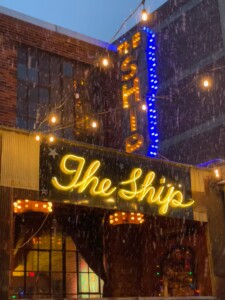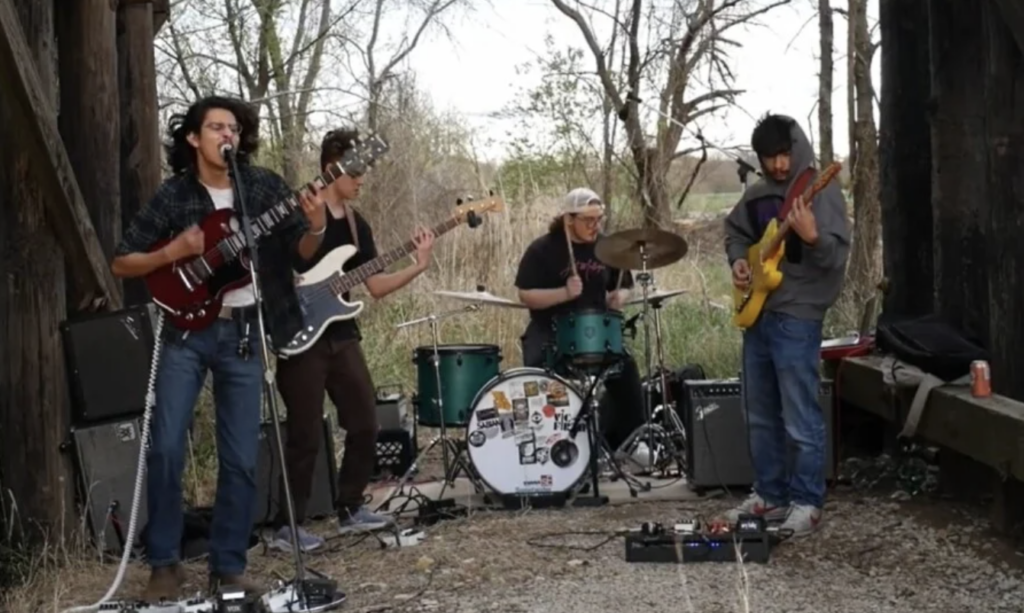Save Our Stages Kansas City: A whole Lotta love at The Ship
Save Our Stages Kansas City is a series of conversations with KC independent music venues. We’ll discuss the pandemic’s (continuing) effects, some challenges facing smaller venues, the value and economic impact these spaces have on our city, and what we can do to support them now and in the future.
At the beginning of December, we had the great pleasure to meet with Lotta Williams, general manager of The Ship, and recently named General Manager of the Year by the Greater Kansas City Restaurant Association.
Lotta invited us inside the cozy confines of the OG room, walls adorned with nautical instruments and memorabilia, and old-school Christmas music playing from their vintage jukebox in the lounge.
After graduating from high school in a small town, Williams moved to the bright lights of Kansas City and soon found her path in the hospitality industry. Tending bar at the Hurricane during the heyday of such bands as Shiner and Season To Risk, she first dabbled in booking bands here before moving to San Francisco at the start of the millennium.
Williams secured a position at the Kilowatt, an eccentric and funky joint in the Mission neighborhood that catered to skaters, musicians, and other hipsters. She worked there for over a decade, and then took a management role at the Lucky 13, a beloved punk rock dive bar that had ties with legendary concert poster artists Frank Kozik and Alan Forbes.
After living in the Bay Area for close to twenty years, Lotta returned to KC in 2017 and started life anew at recordBar and The Ship.
The Pitch: Let’s start with the pandemic and its impact on music venues.
Lotta Williams: In March of 2020, the pandemic hit and venues were shuttered. The Ship was completely closed for 4 – 5 months and we tried to keep everyone employed by finding new financial models. During this time, the former manager had to step away, and owners Bob [Asher] and Josh [Mobley] asked me to manage.
I was like, manage what? Nothing’s open!
I thought, we’ll try to figure it out. At that time, a lot of emphasis was being placed on food, so I thought we need to find a way to sell food to people. We weren’t letting people inside the venue or anything like that, so the plan was to offer delivery. However, we now had to ask bartenders to deal with DoorDash to make money, which is not the same thing at all as bartending. Another hurdle was balancing employees’ income with their ability to draw unemployment.
Following the new law to sell alcohol-to-go during the pandemic, we also created cute basement Mason jar cocktails to generate revenue. And then Josh and Bob had the amazing idea to turn the outdoor smoking deck into a stage for live music.
You saved our lives. Between you and Lemonade Park, you saved my freaking life. And many people’s lives.
It was really amazing. We worked very hard. We would drag everything out there, set up a bar, and drag everything back. The bartenders were leaning over railings trying to hear people. But it did make a huge difference.
People showed up and spaced out. Just like Lemonade Park, we were trying come up with anything and everything we could to try and keep engaged with people. That was a big thing that helped us, staying engaged with people.
After those first 4 – 5 months, we started trying to slowly do things that kept people engaged and kept our staff safe. I was always checking in and asking, “Are you guys ok with this?” I didn’t want to put anyone in a situation where they felt they had to have close contact with people.
What impressed me so much was your concern for everyone’s safety. As a school teacher, I always felt like my first responsibility was to keep the kids safe, and the idea to put the artists up on the deck, and keep the riff-raff like me who want to touch them down in the alley was brilliant. The artists needed to express themselves too, and you created a safe harbor for all. It gave us all something to look forward to in the coming days of possibly the end of the world.
When did you all begin working inside again?
At the start of the pandemic, The Foundation event space behind us went out of business almost immediately. Bob and Josh asked me what I thought about acquiring it, and I said we should absolutely get that space. It was advantageous as we could adhere to all of the six-foot distancing and spacing requirements from the city.
We were already selling things and serving brunch outside on that side of the building. We got some picnic tables at Lowes and spaced them around – that’s how it all started as we were basically running a catering bar. We eventually let people in on that side because winter hit and it was too cold to stay outdoors.
At that time, the mask situation was unclear as for some time we weren’t wearing masks, then we were wearing masks again, and some venues were following along with that, and some weren’t.
We were having issues with the masking orders as the rules were so vague. People could take off their masks as long as they were actively eating and drinking. What does that mean? Like if someone is holding a beer, are you going to time them? Oh, it’s been 30 seconds, you’d better put your mask back on. You can’t do that.
So we waited a bit for indoor shows. At one point, masks weren’t required by the city, but only “suggested,” which is why I and the owners agreed to enforce a vaccination requirement at The Ship. Once the vaccinations were widely available to people, there were a lot of people that didn’t like it, but there were also a lot of people that really did, so it worked.
Thank you for keeping us safe and the artists safe.
If you have a bunch of people in here watching a show, dancing, and having a good time, it’s not that they’re bad people, but they’re not going to keep their masks on. It’s just not reasonable to think that they would. At the time, it seemed to me that the vaccination requirement was a no-brainer. If you want to go out, just bring your vaccination card. Sure, you can come in and decide if you want to keep a mask on, but at least we know everyone in here is making an effort to try and contain the virus.
I’m sure some people were unhappy with that decision.
You know how much hate mail I got during that period of time?
Where was the city government at that time? I’m not sure the city understands how valuable live music is to the economic ecosystem. When we go to shows, we go shopping in the area beforehand, have dinner, stop at the gas station, take an Uber, etc. There are many studies that show for every dollar you spend in a music venue, you spend fifty cents on an ancillary business. The city should capitalize on this and spread the knowledge to business owners so they can realize how important venues are to a city’s economic prosperity and we can truly build the music industry. I’ve been known to blow up Mayor Lucas’ phone with texts regarding the matter, and he always responds.
Mayor Lucas is supportive and comes here regularly.
What are some challenges for venues (pre-pandemic) that maybe people don’t consider about operating a venue?
Music is such a personal choice of what people enjoy or don’t enjoy. The music you provide in your space should be a direct reflection of what kind of people you want to have in there. We want everyone to be comfortable coming into our space, so having an awareness of who is responding to your music is important.
I think a lot of times people, even artists, don’t understand the financial realities of running a venue. We have to pay the sound person, the door people who take the money and check the IDs, carry insurance for live music, and upkeep an old building like this for every single show. There are a million little things in a small space like this, and then you can imagine a larger space too. Electricity and water costs, BMI/ASCAP rights to play music, and many more.
Finding the right price point is important to keep people coming. Some people think there isn’t much difference between a $10 and $15 cover, but there is if you are couple, for example. Same thing for drink and food prices.
When do you feel like you could say things had gotten back to “normal,” or have we? We’re not necessarily out of the woods here. We didn’t really lose a lot of venues during the pandemic (as some would suggest), but we’ve been losing venues here for a long time because it’s a challenging business.
Huge swaths of people in this town have never been to see live music, unless it was a major show like Taylor Swift at Arrowhead (no offense). A child’s first experience might be going to the T-Mobile Center, but they haven’t walked into The Ship for Latin night, or Rex Hobart on a Tuesday.
If we can provide a venue that has something going on that is fun, lively, introducing people to new things and keeping it at an affordable price, our mission is accomplished. People can show up here and anything can be going on. People may not have gone to see that artist on their own, but if they come here they can get exposed to something they may have never seen.
That exactly describes my early experiences at The Ship. My first times here were to see The Grisly Hand after they performed at Boulevardia, maybe 2016 or 2017 (The Ship moved to the current location in 2014). It seemed at the time there were some specific nights that featured country music and organ jazz. Actually, the last performance I attended before the pandemic was on March 12 to see the Greg Meise Trio that Thursday.
My point is, probably after about a year of coming in here, I just knew that no matter what night I come into The Ship, it’s going to be some lively people and some killer music – some of which I don’t know, but I don’t need to know who is playing because it’s always amazing.
You have definitely increased the walking traffic in the West Bottoms and been instrumental in making people feel comfortable about walking around and exploring the area.
That’s what we’re trying to do here, especially with the low prices. We want to make it accessible to people and hopefully expose them to how fun live music can be, even if it’s something you’ve never seen before like The Salvation Choir.
Sometimes you don’t know what you don’t know, and people don’t necessarily know where to look. Also, some venues are geared towards a particular genre of music such as country, blues, or jazz, but that’s not the case at The Ship.
It needs to be a variety and inclusive, not just ethnically and culturally, so as to make sure everyone is represented. Providing platforms for artists is a responsibility and creates community. We want everyone to feel comfortable, even if it’s just to come in for a beer or a snack in the afternoon, or dance on a particular night.
Not sure if you are aware, but the readers of The Pitch voted The Ship “The Best Place To Shake Your Booty.” Also, you recently received some recognition from the Greater Kansas City Restaurant Association as the General Manager of the Year. Congratulations!
What would you say are some qualities of good management of a space or community?
Coming from both angles, I always try to listen and be empathetic. Understanding workloads and hours, people’s lives outside of the venue. When I first moved back here, I was a single mother and I was working a lot trying to rebuild my life and purchase a home. One thing that was always helpful was having a manager/boss who understood I couldn’t stay late as I had to go pick up my child, or if my kid was sick. Someone who is human and doesn’t treat everything like a business. Of course, I do care about it as a business and for the owners, but also for the people who work here to be able to make a living.
You remind me of my manager at The Free State Brewing Company in Lawrence, Debbie Sue Fey. You both have such a nice, quiet calmness, especially when I see you at night amongst the chaos and storm. There is also some firmness to you where I don’t want to disappoint you if I’m not doing what I am supposed to do, as we already agreed to the rules of how the game is played.
That’s exactly how I run it. I’ll give you all the respect and bend over backwards to support you. Come talk with me openly if you need help and I’ll be there.
You’d make a hell of a teacher. How can Kansas Citians support music venues, educate themselves, and talk with businesses and city government about how much stuff we have happening here?
I think it’s really important for people to understand that music is part of what defines you as a community. Every time someone goes out to support live music, you are directly supporting the artists and it keeps everything going. It doesn’t go right into my pockets.
During that first year of the pandemic, your shows on the deck may have been the only money those artists saw all year. They needed that money, but they also needed that connection with the audience.
The real nerds (in a positive way) that just have to have live music constantly, they will always be there. The people that like to go out and experience things aren’t always aware.
Do you have any vision of where you would like to see live music in a year from now? What’s next?
My favorite thing in the whole world is to see a 75-year-old lady in the same space as a 22-year-old kid that has facial piercings. There is nothing that makes me happier. Being able to bring people together, whether it’s by the kind of live music we have or the affordability.
I would like to see more of that, intentionally bringing music to people in unsuspecting ways. People go to the Plaza Art Fair and see things they may not know, but those are huge, corporate events. If you are able to get that in a locally-owned, small business, I think people should support that kind of diversity.
The Ship is open Tuesday–Saturday from 11:00 a.m., and closed Sunday and Monday. Lunch, dinner, cocktails, and refreshments are always available. Live music is back aboard on two stages almost every night. The venue is available to rent for private events of up to 450 people.











